Field bindweed (Convolvulus arvensis) is a common lawn weed that can cause serious damage to your grass and other plants. Though there may be some more common and harmful lawn weeds you will encounter, bindweed’s presence in your yard should not be taken lightly. This article will provide an in-depth look at this weed, including its identifying characteristics, growth habits, and methods of control. So, if you're looking for information on how to deal with field bindweed in your own backyard, read on!
Identifying Field Bindweed
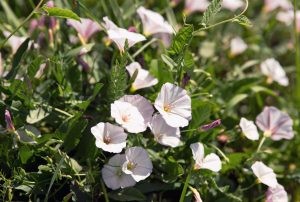
To be clear, field bindweed is not known to be a significant invasive threat to natural habitats in the wild, but it will still severely damage your lawn if it finds its way into your yard, which is why knowing how to properly identify it is important. Field bindweed is a vine-type lawn weed that is most notable for its arrow-shaped leaves and white-to-pink trumpet-shaped flowers. This weed is also known for its twining growth habit and its complex, rope-like root system that emanates deep and wide in the soil from a central taproot. The root structure and twining stems of field bindweed often cause the weed to wrap around and/or crowd out other vegetation in your lawn and garden, often causing lawns to become weak and patchy. When it is not climbing up neighboring vegetation, bindweed grows very low to the ground on its own.
Key Characteristics:
-Trumpet-shaped, white-to-pink flowers
-Arrowhead-shaped leaves
-Often seen climbing up taller plants
-Smooth stems (only slightly hairy)
-Twining stem formation
-Complex, invasive roots
Are Morning Glories The Same As Bindweed?

Field bindweed is often confused for desirable morning glory flowers that gardeners like to plant in their yards. Though bindweed is commonly referred to as "morning glory," the invasive weed is an entirely different plant from garden morning glories. There are thousands of different plants in the Convolvulaceae family (commonly called morning glory or bindweed family), but field bindweed produces flowers that are white or pink, whereas morning glories can come in a wide variety of colors. Most importantly, bindweed is a perennial nuisance with invasive and harmful growth habits, but morning glories are annual plants that grow at a healthy rate and do not disrupt or harm the surrounding vegetation. Basically, the main thing to remember is that you do not want bindweed growing in your yard, but morning glories make beautiful additions to your garden.
When & Where Does Field Bindweed Grow?
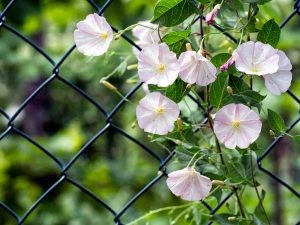
- When: In the Portland area, bindweed flowers typically appear from June to September. Seeds tend to mature and disperse during the hottest days of summer, usually within 2 weeks after pollination. Once in the soil, seedlings germinate through a wide variety of temperatures and conditions, but germination typically occurs sometime in either spring or fall. Seeds of field bindweed can remain viable in the soil for over 20 years, which means these weeds could pop up at any time in your yard and start wreaking havoc on your plants.
- Where: Field bindweed grows throughout the United States, except in the deepest parts of the southeastern states. As the name suggests, this weed is commonly found in open fields, but it is also notorious for popping up along highways and in gardens, as long as there is plenty of direct sunlight. Bindweed is not very competitive in areas that are too shaded, so your chances of seeing it on your property are lower if your lawn and yard are shaded by obstructions. It is moderately drought tolerant, and it prefers disturbed soil where other vegetation is already thriving.
How Field Bindweed Spreads
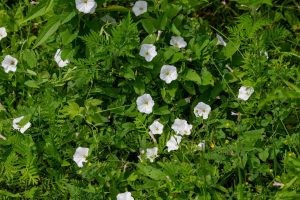
Field bindweed can spread from both seed production and its roots. A single plant produces anywhere between 25 and 300 seeds, and those seeds have a tough outer coat to help them remain viable in the soil for many years. However, the real danger of the spread of bindweed is its root system. Each plant that grows can produce a taproot and lateral root system in the soil that extends further than you might think.
Each individual taproot can grow up to 20 feet deep, and the lateral roots stay close to the soil surface where they can steal nutrients and destroy surrounding vegetation. These invasive root structures often intertwine with other plant roots when they run into them, making it difficult for gardeners to distinguish between the two systems without excessive digging and weeding. Bindweed multiplies at a quick rate by rhizomes that produce new shoots, which means more harmful stems crawling all over your plants.
How To Control Field Bindweed

Field bindweed is one of the most difficult weeds to control in a garden or lawn, so it requires diligent effort to keep it away. Consistent pruning down to the vine can help, but it is a very time-consuming method. The best way to manage the spread is by preventing seed production, which means pulling out any existing bindweed plants before they have a chance to flower and produce seeds. However, this is not always a good long-term solution because of how easily the weed can regenerate, as well as its extensive seed bank in the soil.
Applying glyphosate as the weed is flowering is your best option for removal. After that, mulching in fall and spring is an effective method for preventing those persistent seedlings from emerging. If you live in the Portland area, calling Simple Lawns to take care of your weed control needs is also highly recommended! Professional lawn care companies like ours know all the best control methods, so we can keep your lawn free of harmful bindweed or anything else that pops up where it is not wanted.
Subscribe to Simple Lawns's Blog





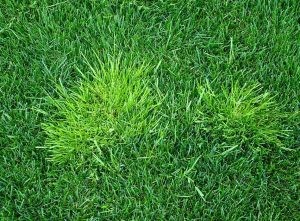
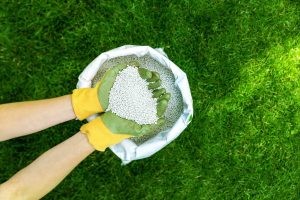

Comments